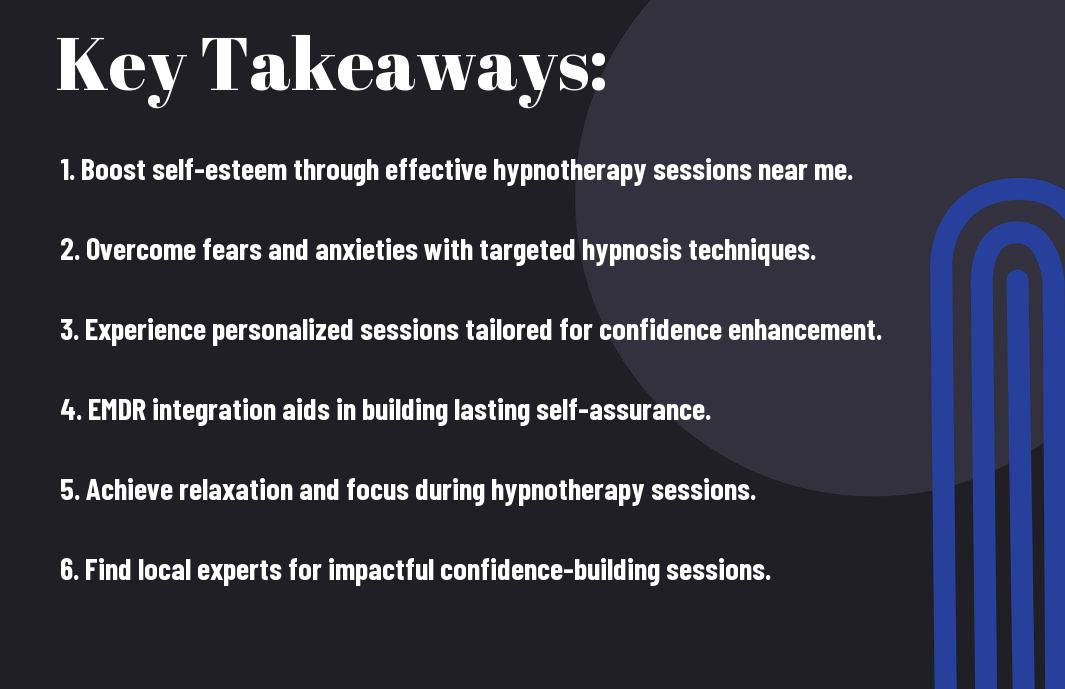Advanced Hypnotherapy Session and EMDR for Confidence
Most people struggle with low self-esteem at some point in their lives, but hypnotherapy sessions offer a powerful solution to boost your confidence. By tapping into your subconscious mind, these sessions help you identify and restructure negative beliefs that hold you back.
Hypnosis and EMDR (Eye Movement Desensitization and Reprocessing) work together to enhance your self-awareness, enabling you to embrace your true potential. If you’re searching for “hypnotherapy sessions near me,” you can find local professionals ready to guide you on a transformative journey toward self-assurance and empowerment.
Understanding Hypnotherapy
Definition of Hypnotherapy
Your journey into the world of hypnotherapy begins with a clear understanding of what it truly is. Any form of therapy that utilizes hypnosis as a primary tool for healing and personal growth is classified as hypnotherapy. During a session, the therapist guides you into focused concentration, resembling a trance-like state, where your subconscious mind becomes more open to suggestion.
In this heightened state of awareness, you can access deeper parts of your mind, allowing you to explore thoughts, memories, and behaviours that may be influencing your confidence levels without your conscious realization.
Your subconscious mind is a powerful reservoir of thoughts and feelings, which often governs your reactions and behaviours. Any skilled hypnotherapist focuses on building a safe and supportive environment to help you confront and address the underlying issues contributing to your lack of confidence.

By allowing you to confront these feelings constructively, hypnotherapy can create new associations and open the door for positive change. You may find that sessions enhance your abilities to visualize success and foster a mindset that encourages self-assurance.
Your experience during hypnotherapy sessions can vary, but the ultimate goal is consistent: to foster a better understanding of yourself and to break free from limiting beliefs. Any effective session aims to empower you and instill a sense of control over your thoughts and actions, thereby improving your overall confidence.
Whether you are seeking to overcome social anxiety, improve public speaking skills, or simply work on self-esteem, hypnotherapy offers a unique pathway to achieving your goals.
Historical Background
Historical context is crucial in appreciating how hypnotherapy has evolved into a respected therapeutic practice. Historically, the roots of hypnotherapy can be traced back to ancient cultures. Many of these societies practiced forms of trance or altered states of consciousness during spiritual rituals, often for healing purposes.
The modern usage of hypnosis as a therapeutic tool began in the 18th century with Dr. Franz Anton Mesmer, who introduced the concept of “animal magnetism” and magnetic healing. Though his theories lacked scientific backing, they laid the groundwork for subsequent developments in the field.
Your understanding of hypnotherapy’s evolution continues into the 19th and 20th centuries when pioneers such as James Braid and Milton Erickson made significant contributions. Braid, a Scottish surgeon, coined the term “hypnosis,” which is derived from the Greek word “hypnosis,” meaning sleep.
He proposed that individuals could be led into a hypnotic state through relaxation and suggestion, positioning hypnotherapy as a more structured method. Erickson advanced the field further by applying therapeutic hypnosis to a variety of psychological conditions, emphasizing the importance of language and personalized suggestions tailored to the individual client.
Another profound evolution in hypnotherapy occurred during the late 20th century when rigorous scientific research began to validate its effectiveness. Emerging evidence showcased its ability to aid in pain management, anxiety relief, and confidence-building, among numerous other applications. Today, you can find hypnotherapy integrated into various psychological practices and wellness settings, emphasizing its versatility as a therapeutic approach.
How Hypnotherapy Works
Your understanding of how hypnotherapy works begins with the concept of altered states of consciousness. Historical research has shown that when you enter a hypnotic state, your brain waves shift, typically moving from an active beta state to a more relaxed alpha or theta state.
In these states, you become more receptive to positive suggestions and ideas, allowing you to make profound changes in behaviour and perception. Your inner critic often takes a backseat, providing an opportunity to reprogram limiting beliefs and thought patterns that may undermine your confidence.

This transformative process occurs primarily through visualization and suggestion. As a participant in hypnotherapy, you will often be guided into visualizing specific scenarios where you demonstrate confidence and success.
This mental rehearsal allows your mind to create new neural pathways that foster self-belief and reduce anxiety. By repetitively engaging with these visualizations in a relaxed state, your subconscious begins to accept these new perceptions as reality, leading to tangible improvements in your daily life.
This practice of suggestion extends beyond mere visualization. For you, suggestions may also encompass affirmations related to self-worth, courage, and social situations that previously invoked fear or doubt.
Your hypnotherapist will tailor these messages specifically to your needs, providing personalized feedback and support. By connecting deeply with these tailored suggestions during sessions, you can harness the power of hypnotherapy to instill a renewed sense of confidence.
The Brain and Hypnosis
Background research into the brain’s response to hypnosis reveals fascinating insights about its workings. When you enter the hypnotic state, your brain experiences unique changes in its activity and connectivity.
Studies using neuroimaging techniques have shown that areas responsible for awareness, concentration, and self-control become highly active while those related to self-criticism and judgment diminish. This shift allows you to engage with new thoughts and experiences without the mental barriers that may have previously held you back.
To research deeper into these processes, you can observe that hypnosis engages the default mode network (DMN) in your brain, which is responsible for internal dialogue and self-referential thought.
This active DMN helps you reflect upon your beliefs and attitudes, allowing for re-evaluation of negative self-perceptions. Combined with the relaxation techniques employed in hypnotherapy, you can significantly enhance your capacity for introspection and awareness, ultimately leading to increased confidence.

The Connection Between Hypnotherapy and Confidence
Now, if you are on a journey to enhance your confidence, understanding how hypnotherapy can play a pivotal role is crucial. Confidence is not merely a trait; it is a psychological state that can be developed and fortified over time. It is influenced by your thoughts, beliefs, and the environment around you.
By exploring the dynamics of confidence through the lens of psychology, you can begin to unravel the layers that keep you from feeling your best self. This understanding sets the stage for how hypnotherapy can effectively restore your self-worth and enrich your life experiences.
The Psychology of Confidence
One of the first steps to improving your confidence is recognizing that confidence itself is rooted deeply in your perception of self. It involves how you view your abilities, your past experiences, and how you’re influenced by the opinions of others.
Often, your mind may be your worst critic, creating a cycle of negative thoughts that can be difficult to break. Hypnotherapy works by accessing your subconscious mind where these limiting beliefs reside. By addressing and altering these deep-seated psychological barriers, you begin to foster a more empowering narrative about yourself.

Furthermore, confidence can be significantly affected by early life experiences, social interactions, and innate predispositions. When you subjectively analyze your experiences, you may find that they have formed unfounded fears or doubts that hold you back. Hypnotherapy offers a unique opportunity to gently revisit and reframe these experiences.
In a relaxed state, you can begin to process past events with a fresh mind, free from the anxieties and stress that may have clouded your judgment previously. In doing so, you craft a stronger foundation for self-confidence.
Finally, cultivating confidence involves more than just changing your mindset; it requires the development of healthy habits and behaviours. Hypnotherapy can not only help you adjust your internal narrative but also instill empowering habits through positive suggestions.
You can learn to replace self-doubt with affirmations that reinforce your abilities, supporting your journey toward self-assuredness and poise. As a result, the subconscious shifts you experience during hypnotherapy sessions can lead to significant behavioural changes that enhance your confidence in everyday life.
How Hypnotherapy Can Alter Perceptions
The connection between your perceptions and confidence is profound. The way you see yourself directly influences how confident you feel in various situations. Hypnotherapy has the potential to rewire these perceptions by engaging your subconscious mind, allowing you to view yourself through a more constructive lens.
Through guided relaxation and suggestion, the often negative perceptions can be reframed to highlight your strengths and capabilities, nurturing a positive self-image that is vital for boosting confidence.
Hypnotherapy sessions can help you recognize and challenge the negative self-beliefs that you may carry, often without even realizing it. These beliefs can stem from past traumas, societal expectations, or even the criticisms of those around you. By harnessing the power of your subconscious, you can begin to replace those debilitating thoughts with empowering messages that reflect the true potential within you. This transformation occurs because hypnotherapy allows you to bypass the critical mind, accessing your core beliefs directly, and opening the door for deep, lasting change.
Common Confidence Issues Addressed
Hypnotherapy is particularly effective for addressing various common confidence issues that you may encounter throughout your life. Whether it’s a fear of public speaking, anxiety in social situations, or feelings of inadequacy in a professional setting, these challenges can significantly impact your everyday experiences.
During a hypnotherapy session, you can explore the roots of these issues while developing coping mechanisms that can bolster your confidence. This targeted approach allows you to tackle your unique challenges with the support of a trained professional.
Additionally, hypnotherapy can assist with performance anxiety, equipping you with the tools necessary to face high-stakes situations with calmness and self-assuredness. By coming to terms with your doubts through guided relaxation and visualization techniques, you can develop a stronger self-concept that stands up to life’s pressures.
The more confident you become in these areas, the more likely you are to seek out new opportunities and embrace challenges, leading to increased satisfaction in both your personal and professional life.
Understanding the common issues related to confidence can help you feel more aware of your struggles. It’s crucial to know that you are not alone in facing these challenges and that hypnotherapy sessions can provide a path to healing and confidence-building. Many individuals have experienced transformative results through hypnotherapy, and with the correct guidance and support, you can begin on your journey to a more confident self.

Preparing for Hypnotherapy Sessions
Not everyone knows how to effectively prepare themselves for a hypnotherapy session, but with the right approach, you can optimize the process and enhance your experience. This preparation starts with one crucial element – setting personal goals.
By clearly defining what you want to achieve from your hypnotherapy sessions, you create a roadmap that guides both you and your hypnotherapist throughout the journey. Goals could range from overcoming social anxiety, boosting self-esteem, or even tackling specific phobias. Taking the time to establish these objectives will not only make your sessions more focused but also empower you to track your progress.
Setting Personal Goals
For many individuals, setting personal goals means reflecting on your current challenges and aspirations. You should take the time to journal about your feelings and experiences regarding confidence and self-image. What specifically holds you back? Is it a fear of public speaking, difficulties in forming relationships, or a general feeling of inadequacy?
Once you have articulated these points, you can translate them into actionable goals. For instance, rather than saying “I want to be more confident,” a more tailored goal might be, “I want to feel at ease during social interactions and express my thoughts clearly.” This targeted approach gives you clearer objectives and creates a more meaningful connection with your sessions.
Another important aspect of goal-setting is ensuring they are realistic and achievable. Setting overly ambitious goals may lead to frustration if progress is not immediate. It’s often beneficial to break larger goals into smaller, manageable tasks that can be achieved over time. This provides you with a series of accomplishments to celebrate along the way, reinforcing your motivational drive.
Additionally, be open to revisiting and adjusting your goals as you progress in your hypnotherapy. Your experiences may reveal new insights that shift your objectives, and that’s perfectly normal. Establishing flexible, adaptable goals can enhance your overall experience and growth.
Choosing a Qualified Hypnotherapist
To ensure you receive the best treatment for enhancing your confidence through hypnotherapy, selecting a qualified hypnotherapist is imperative. Not all practitioners possess the same level of expertise or training, which can significantly affect the quality of your sessions.
Start by researching hypnotherapists in your area, utilizing searches like “hypnotherapy sessions near me” to find reputable professionals. Look for certifications and qualifications that demonstrate their training in hypnotherapy techniques, particularly those related to confidence building. Ensuring that the therapist adheres to ethical guidelines and best practices will give you added reassurance.
When you have a shortlist of candidates, consider scheduling an initial consultation with each. This meeting allows you to gauge their approach and to determine if you feel a personal connection and comfort level with them.

Ask questions about their experience in helping clients overcome issues related to confidence, as well as their treatment methods. It’s vital that you feel at ease with your hypnotherapist, as the success of your sessions will largely depend on the trust and rapport you establish with them. The right hypnotherapist will not only be trained but also attentive to your unique needs and concerns.
Another factor to take into account when choosing a hypnotherapist is their success rate with past clients. Don’t hesitate to request testimonials or references that reflect previous experiences. A reputable hypnotherapist should be comfortable sharing these with you.
Additionally, consider their methodology – do they emphasize collaboration with their clients and encourage a dialogue about your goals? A therapist who values your input and strives to involve you in the process is likely to provide a more effective hypnotherapy experience focused on your unique journey.
What to Expect in a Session
Setting the right expectations for your hypnotherapy sessions is crucial for reducing any apprehension or anxiety you may feel beforehand. Many individuals may have misconceptions about what hypnotherapy entails, leading to misunderstandings about the process. In reality, you will be guided into a deeply relaxed state by your hypnotherapist, where your subconscious becomes more receptive to positive suggestions.
It’s important to approach the session with an open mind, allowing yourself to immerse in the experience fully. The more you engage with the process, the greater the likelihood of achieving your goals.
The actual session will typically involve an initial period of dialogue where you and your hypnotherapist explore your goals and challenges in detail. This serves to establish a clear understanding of what you hope to achieve.
Following this, the hypnotherapist will guide you into a relaxed state, using various techniques such as visualization or breathing exercises. Once you are in this state, they will introduce affirmations and suggestions tailored to your personal goals. You might experience vivid imagery or recall memories that are crucial to your confidence-building process.
It’s also important to recognize that hypnotherapy doesn’t operate on a one-size-fits-all basis. Your unique experiences will shape the direction of each session, and you might find that each session will differ in its focus.
Sessions might also vary in length and depth depending on the techniques used and the therapist’s style. Be patient with yourself, as progress may take time, and remember that the journey is just as significant as the destination. Keep in mind that your hypnotherapist will continually encourage you to share your thoughts and feelings during the sessions, allowing for adjustments to enhance your treatment further.

With a deeper understanding of what to expect, you can approach your hypnotherapy sessions with confidence, knowing that your hypnotherapist is there to provide guidance and support throughout the process. Hypnotherapy is a collaborative journey focused on you and tailored to your needs, aiming to foster a new sense of empowerment and self-belief.
Establishing a Safe Environment
Session after session, ensuring that the environment you are in is safe and comfortable is vital for a successful hypnotherapy experience. You must feel at ease in the setting, as it fosters an open mindset that allows you to embrace the process fully.
Whether you’re attending sessions in an office space or remotely via video call, your surroundings should promote relaxation. If you feel uneasy about the environment, communicate this with your hypnotherapist so they can address your concerns by creating a more conducive atmosphere.
This aspect of safety goes beyond just physical comfort. Emotional safety is equally important during hypnotherapy sessions. Your therapist should build trust through a non-judgmental attitude and by encouraging you to express your emotions and vulnerabilities freely.
The more secure you feel, the more open you will be in communicating your thoughts and concerns, which can enhance the effectiveness of your therapy sessions. The ability to share without judgment can create an emotional bond that is imperative for progress.
Additionally, privacy plays a significant role in establishing a safe environment. When discussing personal issues related to your confidence, it’s important to know that your information is handled discreetly and confidentially.
Before beginning your sessions, ask your hypnotherapist about their privacy policy to ensure you feel secure in sharing sensitive information. By fostering an environment in which you feel both physically and emotionally comfortable, you can significantly enhance the benefits gained from your hypnotherapy sessions.
Safe spaces promote open dialogue between you and your hypnotherapist, ensuring that you can express your thoughts freely. This harmony is crucial for allowing you to absorb and process the suggestions made during your sessions while cultivating a supportive framework that furthers your personal development.
Structure of a Hypnotherapy Session
Despite the common misconceptions, hypnotherapy is a structured and methodical process that is designed to help you build confidence effectively. Each session typically follows a specific framework that enables you to enter a state of relaxation and receptiveness.
Understanding the various stages of a hypnotherapy session can demystify the process and help you feel more comfortable when seeking “hypnotherapy sessions near me.” The session can be broken down into several key parts, each with its purpose and function in aiding your progress toward increased self-assurance.
Initial Consultation
For the first part of your hypnotherapy experience, you will undergo an initial consultation. This meeting usually serves as an opportunity for you and your hypnotherapist to discuss your personal goals, experiences, and any concerns you might have. During this time, your therapist will ask questions that help them understand your unique situation and tailor the session to your specific needs. This is crucial in creating a safe environment where you can openly express your frustrations and aspirations related to your confidence levels.
Your initial consultation also allows the therapist to explain what hypnotherapy entails. You will learn about the methods used and the nature of the hypnotic state. This transparency is vital for alleviating any apprehensions or misconceptions you may have regarding hypnotherapy. The more informed you are, the better prepared you’ll be to engage in the process, optimizing your chances of reaching your confidence goals.
Additionally, your therapist may conduct a brief assessment to determine your emotional and psychological readiness for hypnosis. This might include questionnaires, discussions about previous therapeutic experiences, or exploring certain beliefs you hold about yourself. All of these elements contribute to creating a tailored experience that aims to set you up for success in your hypnotherapy journey.
Induction Techniques
To transition you into the hypnotic state, your hypnotherapist will employ various induction techniques. These methods are designed to channel your focus inward, allowing you to break free from external distractions. Common techniques may include progressive relaxation, visualization, or verbal cues. Regardless of the method employed, the aim is to create a calm environment where stress and anxiety are minimized, setting the stage for deeper work.
The induction phase is critical because it helps you drop your guard and enter a more suggestible state of consciousness. It’s during this phase that you will learn to let go of conscious thoughts while embracing the feelings of tranquillity and safety that the therapy provides. The effectiveness of the upcoming stages hinges largely on how successfully you can enter this state, underscoring the importance of this initial phase in the therapy session.
Structure in induction can vary, but the focus remains the same: guiding you toward a relaxed state where your subconscious mind is more open to exploration and acceptance of positive suggestions aimed at enhancing your confidence. Even brief durations in this hypnotic condition can yield profound changes, leaving you with a sense of empowerment.
Deepening the Hypnotic State
On entering the initial hypnotic state, your therapist will then employ techniques to deepen this experience further. This often includes additional relaxation methods, visualization techniques, or specialized prompts that aim to enhance your level of trance.
Deepening strategies are vital as they help to dull external sensory perceptions and create a more immersive experience. As your body relaxes and your mind quiets, you become increasingly receptive to the therapeutic suggestions that will follow.
By deepening the hypnotic state, your therapist aims to help you access deeper layers of your subconscious mind. It’s in this deeper state where you might confront limiting beliefs or fears that have hindered your confidence and self-esteem. For this reason, the deepening techniques serve as a bridge to a more impactful exploration of your heartfelt goals.
For instance, deepening might involve counting down from ten to one or visualizing descending a staircase. These techniques make you feel as though you are sinking deeper into relaxation, which creates a conducive atmosphere for mental transformation. The stage is effectively set for the next phase of your hypnotherapy session.
Suggestion Phase
Deepening the hypnotic state leads seamlessly into the suggestion phase. This is where the real work begins; your hypnotherapist delivers tailored affirmations and positive suggestions designed specifically to target issues related to confidence.
These suggestions work by influencing your subconscious mind, helping you to reshape negative thought patterns and beliefs that may have weighed down your self-esteem. This phase is integral to the effectiveness of your sessions, as the suggestions are aimed at integrating new, positive beliefs into your self-concept.
Your therapist may use a variety of approaches during this phase, including positive affirmations, visualization exercises, or metaphors that hold emotional significance. The aim is to instill a strong sense of confidence and to reinforce your ability to face challenges with assurance. The suggestions are often framed in a manner that promotes self-empowerment, helping you envision success in situations where you might have previously felt inadequate.
Phase elucidation during this step allows you to immerse yourself mentally and emotionally in new perspectives, paving the way for genuine change. As you absorb these new concepts, your subconscious mind starts to shift its beliefs, creating a foundation for increased self-confidence in your daily life.
Reawakening
Deepening your experience moves toward the final stage, which is the reawakening. In this phase, your therapist provides gentle prompts to help you gradually transition back to a fully alert state. This reawakening process is crucial, as it allows you to return to your surroundings with a fresh perspective and newfound confidence. The therapist will often do this in a calibrated manner, ensuring you feel relaxed while smoothly transitioning from the hypnotic state.
During reawakening, you might also reflect on the journey you’ve experienced during your session. By guiding you through your feelings and thoughts as you come back to full consciousness, your therapist reinforces the positive messages and insights you gained during the suggestion phase. This reflection can deepen the impact of the session, embedding the changes more firmly into your awareness.
Hypnotherapy sessions typically conclude with affirmation and encouragement from the therapist, emphasizing the positive changes you have set in motion. By leaving the session with a stronger sense of self and compiled strategies to face life, you’ll feel empowered to initiate your journey of confidence-building.
Techniques Used in Hypnotherapy for Confidence
For those seeking to enhance their self-esteem and confidence, hypnotherapy offers various techniques designed to address deep-seated beliefs and emotions. Each technique aims to facilitate a transformation in your mindset, helping you to develop a more positive perception of yourself.
The methods employed during hypnotherapy sessions can vary widely but often encompass practices such as visualization, positive affirmations, regression techniques, and desensitization processes. Understanding these techniques can empower you to make informed decisions about which approach may best suit your needs.
Visualization and Imagery
One powerful technique used in hypnotherapy for boosting confidence is visualization and imagery. This process involves creating mental images of desired outcomes. When you positively engage your imagination, you can simulate experiences that foster self-assuredness.
During your hypnotherapy sessions, your therapist will guide you into a relaxed state where you can envision yourself confidently facing various situations that would typically induce anxiety or self-doubt. Whether it’s delivering a presentation at work or meeting new people, visualizing these scenarios helps your mind prepare for the experience.
One of the benefits of visualization is that it allows you to pre-experience success without the accompanying stress. When your subconscious mind perceives these scenarios as real, it begins to accept them as possible outcomes, effectively rewriting your internal narrative about competence.
You may find that repeated visualization of success not only improves your self-image but also enhances your motivation to pursue real-world challenges. By repeatedly practicing this technique through hypnotherapy sessions, you’re actively rewiring your brain to associate confidence with various situations.
Moreover, this technique encourages relaxation and facilitates a sense of control. When your mind is relaxed and focused on positive images, it becomes more receptive to change. This shift can significantly alter your behaviour by instilling a deep sense of belief in your abilities.
As you continue to practice this visualization technique, you may notice that new opportunities arise, and you are better equipped to seize them. Ultimately, incorporating visualization into your hypnotherapy sessions can be a vibrant game-changer, helping you establish a strong foundation of confidence.
Positive Affirmations
Used in conjunction with other techniques, positive affirmations play a crucial role in hypnotherapy aimed at confidence building. Positive affirmations are short, powerful statements that reinforce your self-worth and capabilities.
When you consistently repeat affirmations during hypnotherapy sessions while in a relaxed and open state, your subconscious mind starts to internalize these healing messages. This process enables you to counteract negative self-talk and limiting beliefs that may have been holding you back for years.
By using specific affirmations such as “I am confident in my abilities,” or “I attract success and positivity,” you create a mental landscape that nurtures and cultivates confidence over time. Hypnotherapists often tailor these affirmations to resonate with your personal experiences and goals, enhancing their effectiveness.
The beauty of positive affirmations lies in their simplicity; they can be seamlessly integrated into your daily routine, allowing you to reinforce the beliefs established during your sessions.
Incorporating positive affirmations into your life complements the transformative work done during your hypnotherapy sessions. You can repeat these affirmations in front of a mirror, while journaling, or simply during quiet moments of reflection.
This continuous interaction with your affirmations instills a deep-seated belief in your strengths and potential. As you consistently affirm your worth, you may find that your interactions become more authentic, open, and impactful.
Regression Techniques
The use of regression techniques in hypnotherapy can lead you to uncover the root causes of your confidence issues. This therapeutic method involves guiding you back to past experiences that may have significantly influenced your self-perception.
Through a relaxed state of hypnosis, you can explore these memories and identify patterns of behaviour that have contributed to your current feelings of insecurity. Understanding the origins of your challenges offers you a valuable perspective that can facilitate healing and growth.
Engaging in regression techniques allows you to assess long-standing beliefs that were formed during formative years. It can be eye-opening to realize how past events have shaped your mindset and self-image.
By revisiting these experiences in a supportive environment, you can rewrite your emotional responses and reframe the narratives that no longer serve you. This process is profound and necessary for those looking to cultivate unshakeable confidence.
Ultimately, regression techniques create a safe space for you to confront and heal from unresolved issues. By allowing your therapist to guide you through these reflections, you gain insight that helps dismantle the barriers to confidence you’ve encountered throughout your life.
As you progress, you will likely find that these newfound understandings empower you to step outside of your comfort zone with a renewed sense of assurance.
Desensitization Processes
Confidence-building often requires confronting fears or anxieties that impede your growth. Desensitization processes within hypnotherapy tackle this by gradually exposing you to the contexts or situations that trigger discomfort.
During your sessions, your therapist may introduce scenarios that provoke your anxiety while in a relaxed state, providing you with a safe space to process these feelings. This approach enables you to develop coping strategies and a level of comfort in facing these challenges.
Through desensitization, you begin to retrain your brain’s response to fear and anxiety. By engaging repeatedly with anxiety-provoking scenarios in a controlled environment, you foster resilience and emotional stability.
Consequently, the more you practice confronting these situations under hypnosis, the less intimidating they become in your waking life. This newfound resilience helps you approach challenges with a clear and confident mindset.
For instance, if public speaking causes you significant anxiety, your hypnotherapist can simulate a speaking scenario during your sessions. Over time, as you expose yourself to this situation in a supportive context, you’ll learn to manage your feelings of fear more effectively. As a result, you’ll gain the confidence to engage in real-life speaking opportunities, leading to improvement in not just your public speaking skills, but also your overall self-esteem.
Expected Outcomes and Benefits
Short-term Benefits
Expected outcomes from hypnotherapy sessions for confidence can manifest relatively quickly. During the initial sessions, you may notice a marked reduction in anxiety levels, enabling you to approach challenging situations—like public speaking or social interactions—with a newfound sense of calm.
This immediate relief can significantly shift your mindset, steering you towards a more confident way of thinking and behaving in day-to-day life. You may also experience a boost in self-esteem and motivation, empowering you to engage in activities or goals you’ve previously shied away from.
Another short-term benefit is the enhancement of your focus and concentration. Since hypnotherapy promotes relaxation and mental clarity, you may find it easier to tackle tasks that require sustained attention.
This increased focus can astronomically improve your performance in both professional and personal endeavours. When you feel mentally clear and supported, creating a trajectory toward your goals becomes that much more achievable.
An additional short-term benefit arises from improved self-awareness. Through the process of hypnotherapy, you gain insights into your thought patterns, allowing you to recognize and dismantle limiting beliefs that may unconsciously hinder your confidence.
You may discover thought distortions or negative self-talk that no longer serve you. Armed with this awareness, your ability to navigate everyday challenges becomes significantly heightened, facilitating the development of healthier coping strategies as you move forward.
Long-term Changes
Changes stemming from hypnotherapy sessions for confidence can have lasting effects that reach far beyond the immediate benefits. Once you harness newly developed coping mechanisms and heightened self-awareness, you may find that your confidence expands into multiple areas of your life.
This self-assurance can lead to more effective communication, improved relationships, and greater professional opportunities—ultimately helping you create a life that reflects your true potential.
Furthermore, you will likely notice a reduction in self-sabotaging behaviours. Over time, hypnotherapy can help you replace negative patterns with positive habits, solidifying the belief in your capabilities.
Long-term changes through these therapeutic sessions promote a healthy cycle where your continued successes reinforce your confidence and drive you to strive for even greater aspirations. You may become more willing to take risks, recognize achievements, and celebrate victories—big and small.
This newfound resilience can have ripple effects throughout your lifestyle. As you build confidence, you will likely attract supportive and uplifting relationships, fostering an environment that encourages growth.
You may also engage in activities that challenge you to step outside your comfort zone, leading to experiences that further enhance your personal and professional growth. In essence, the long-term changes you experience through hypnotherapy sessions for confidence can create transformative shifts, allowing you to embrace your fullest potential.
Personal Testimonials
Long-term outcomes from hypnotherapy are often best illustrated by personal testimonials from individuals who have experienced life-altering changes. Many clients report a reawakening of their innate confidence, often sharing stories of how the sessions helped them overcome significant barriers.
These testimonials can be a powerful motivator for you to commence your journey toward self-improvement and empowerment through hypnotherapy.
Others indicate that the sessions allowed them to confront fears that had been holding them back for years. The stories shared typically reflect an evolution from self-doubt to a robust belief in their competencies. Witnessing the success of peers can evoke hope and encouragement, showcasing that real changes are indeed possible through dedication and the right kind of support.
Outcomes like increased self-esteem and improved assertiveness permeate the narratives shared by those who have undergone hypnotherapy. The personal stories you encounter often serve as both inspiration and source material for understanding the potential impact of these sessions, reinforcing that hypnotherapy can be a life-changing experience in your quest for greater confidence.
Risks and Limitations
On the other hand, while hypnotherapy sessions for confidence provide numerous benefits, it’s necessary to acknowledge the potential risks and limitations. Not everyone responds to hypnotherapy in the same way, and there may be instances where individuals experience minimal improvements despite their dedication.
It’s important to approach this therapy with realistic expectations, understanding that results can vary based on personal circumstances, underlying issues, and one’s readiness for change.
You should also be aware of the importance of selecting a qualified and experienced hypnotherapist. Working with someone who lacks proper training can lead to ineffective sessions or even unintended side effects.
Additionally, hypnotherapy may not be suitable for individuals with certain medical or psychological conditions, such as severe mental disorders or a history of trauma. It’s critical to consult with healthcare professionals before beginning hypnotherapy to ensure that it’s a fitting and safe avenue for you.
To maximize the effectiveness and mitigate the risks associated with hypnotherapy, it’s advised to couple it with other therapeutic interventions, such as cognitive-behavioural therapy (CBT) or counselling. This integrated approach can provide a comprehensive support system, tackling both the conscious and subconscious barriers to your confidence development.
By approaching hypnotherapy with an understanding of its limitations, you can create a more focused strategy that ensures you leverage its effectiveness while being mindful of the risks involved.
Conclusion
The journey toward building your confidence can be significantly enhanced through the utilization of hypnotherapy sessions. These sessions offer you a unique opportunity to access your subconscious mind, allowing for the exploration and transformation of deep-seated beliefs and thought patterns that may be holding you back.
By utilizing techniques combined with EMDR (Eye Movement Desensitization and Reprocessing), hypnotherapy helps you address your fears and self-doubt, facilitating a profound shift in your self-perception and injecting positivity into your mindset. As you engage in these tailored sessions, you will likely notice enhanced resilience and a newfound self-assuredness that permeates through all aspects of your life—from personal relationships to professional endeavours.
Your proactive search for “hypnotherapy sessions near me” indicates your commitment to pursuing tangible change, and it is crucial to find a licensed hypnotherapist who will guide you along your journey. They will work closely with you to identify your unique goals, ensuring that each session is deeply personalized to align with your specific needs.
With a compassionate approach and professional expertise, they will help you navigate through concerns such as anxiety, public speaking, or self-sabotage, unlocking your true potential. This commitment to your mental health and personal growth not only fosters improved confidence but also creates a more positive self-image, enabling you to tackle challenges that may have once seemed insurmountable.
Ultimately, embracing hypnotherapy sessions for confidence is not just an investment in a temporary boost but a gateway to long-lasting change within yourself. By consistently committing to the process, you will cultivate the tools necessary to enhance your self-esteem and reclaim control over your thoughts and feelings.
Recall, that the road to confidence may have its hurdles, but with the right support and techniques at your disposal through hypnotherapy, you are well-equipped to overcome them. So take the next step and reach out to find the best hypnotherapy sessions near you, and begin the transformation that awaits you on this empowering journey.
The Official Instagram profile of Mind Spirit Body Hypnosis services and advanced hypnotherapy sessions.
About the author: Award-winning Fanis Makrigiannis of Mind Spirit Body Hypnosis Services is a certified Hypnotherapist and Master Practitioner of Neuro-linguistic Programming with the American Board of Hypnotherapy. Proudly serving Durham Region, The Greater Toronto Area, Peel Region, Ontario, Canada, and the United States of America via Zoom meetings.




